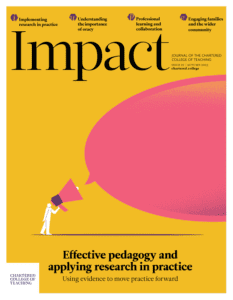Leveraging homework for effective learning: Exploring the benefits of spaced and interleaved practice
Written by: Andrew Jones

7 min read
ANDREW B. JONES, ASSISTANT HEADTEACHER, THE REACH FREE SCHOOL, UK; PROFESSIONAL DEVELOPMENT LEAD, THE WATFORD PARTNERSHIP FOR TEACHER TRAINING, UK
Over the past decade, researchers have gained a better understanding of spaced and interleaved practice as effective strategies for enhancing retention and retrieval performance (Bjork and Bjork, 2019; Brunmair and Richter, 2019; Donoghue and Hattie, 2021). Spaced practice involves distributing learning sessions over time, improving long-term retention, while interleaved practice mixes different topics or problems, enhancing comparison and contrast.
However, the concept of mixing syllabuses in an interleaved manner rather than teaching them in sequential blocks poses challenges, especially considering the need for pupils to master foundational knowledge before progressing to more complex material. Additionally, the practical and contextual constraints of the National Curriculum, GCSE and A-level syllabuses, which are predominantly desi
Join us or sign in now to view the rest of this page
You're viewing this site as a guest, which only allows you to view a limited amount of content.
To view this page and get access to all our resources, join the Chartered College of Teaching (it's free for trainee teachers and half price for ECTs) or log in if you're already a member.
- Bjork RA and Bjork EL (2019) The myth that blocking one’s study or practice by topic or skill enhances learning. In: Barton C (ed) Education Myths. Woodbridge: John Catt Publishing, pp. 59-72.
- Brunmair M and Richter T (2019) Similarity matters: A meta-analysis of interleaved learning and its moderators. Psychological Bulletin 145(11): 1029–1052.
- Carpenter SK, Cepeda NJ, Rohrer D et al. (2012) Using spacing to enhance diverse forms of learning: Review of recent research and implications for instruction. Educational Psychology Review 24: 369–378.
- Donoghue GM and Hattie JAC (2021) A meta-analysis of ten learning techniques. Frontiers in Education 6: 581–216.
- Firth J, Rivers I and Boyle J (2021) A systematic review of interleaving as a concept learning strategy. Review of Education 9(2): 642–684.
- Jones AB (2021) Homework with Impact: Why What You Set and How You Set It Matters. Abingdon: Routledge.
- Rohrer D, Dedrick RF, Hartwig MK et al. (2019) A randomized controlled trial of interleaved mathematics practice. Journal of Educational Psychology 112(1): 40–52.
- Rohrer D, Dedrick RF and Stershic S (2015) Interleaved practice improves mathematics learning. Journal of Educational Psychology 107(3): 900–908.
0
0
votes
Please Rate this content
Subscribe
Please login to comment
0 Comments
Oldest
Newest
Most Voted
Inline Feedbacks
View all comments










